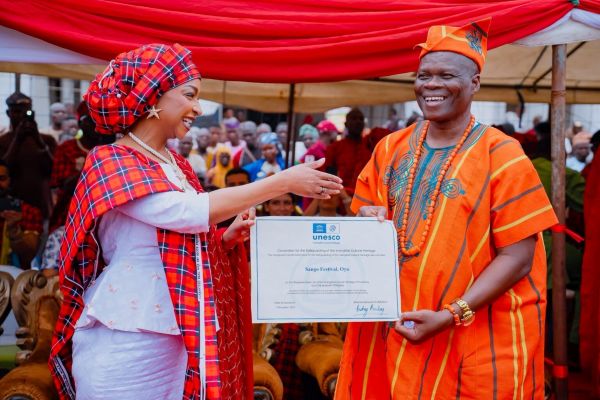UNESCO Inscribes Sango Festival as World Heritage, Boosting Nigeria’s Cultural Capital

Nigeria’s cultural diplomacy scored a major milestone as the Sango Festival of Oyo received formal recognition from UNESCO as part of the Representative List of the Intangible Cultural Heritage of Humanity. The inscription, announced at the 2025 World Sango Festival in Oyo, elevates the Yoruba cultural icon to the global stage, unlocking new opportunities for tourism, heritage preservation, and creative economy growth.
A Global Recognition for Yoruba Heritage
At the festival’s grand finale, Minister of Art, Culture, Tourism and the Creative Economy, Hannatu Musawa, presented UNESCO’s certificate to the Alaafin of Oyo, Oba Abimbola Abdulhakeem Owoade I. She described the achievement as proof of Nigeria’s commitment to safeguarding its cultural heritage while using it as a strategic tool for international diplomacy and sustainable development.
“This milestone firmly places Sango’s rich heritage on the world stage and underscores its importance as a shared global heritage,” Musawa declared.
Economic and Diplomatic Leverage
The recognition goes beyond cultural pride. With UNESCO status, the Sango Festival is now positioned as a tourism magnet, capable of drawing international visitors, creating local jobs, and strengthening Nigeria’s cultural exports. It also aligns with the Federal Government’s Renewed Hope Agenda, where heritage is being framed as a pillar for wealth creation, employment, and soft power diplomacy.
Industry experts note that cultural festivals such as Sango are no longer just seasonal celebrations but economic assets. They generate inflows from hospitality, merchandising, cultural tourism, and creative industries—areas Nigeria seeks to scale up as oil revenues falter.
Oyo’s Historic Role in Nigeria’s Cultural Identity
The Alaafin of Oyo, in his remarks, celebrated the recognition as both a cultural revival and an opportunity for the Yoruba nation to showcase its global relevance. Historically, Oyo has been the cradle of Sango worship, a festival that fuses spiritual reverence, artistic performance, music, and dance into a unique expression of African identity.
For decades, the festival has drawn devotees, tourists, and culture enthusiasts, but UNESCO’s recognition rebrands it into a heritage economy driver, strengthening Nigeria’s push to position itself as Africa’s cultural powerhouse.
The Bigger Picture: Culture as an Economic Engine
The recognition of the Sango Festival adds to Nigeria’s growing portfolio of UNESCO-listed heritage assets, reinforcing the case for policy investment in culture as an economic driver. Analysts suggest that with better infrastructure, digital promotion, and structured festival tourism circuits, Nigeria could attract billions in annual revenue from heritage tourism.
As global tourism increasingly embraces authentic cultural experiences, the Sango Festival now stands shoulder-to-shoulder with global heritage icons—from Brazil’s Carnival to Japan’s Gion Matsuri.
BRANDECONOMY Insight
UNESCO’s inscription of the Sango Festival is not just a cultural victory; it is a business and policy opportunity. By leveraging the recognition, Nigeria can position its cultural festivals as global tourism brands, integrate them into its creative economy strategy, and use them to expand soft power influence across Africa and the diaspora.












